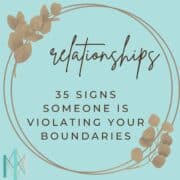
Setting boundaries is essential for maintaining healthy relationships, self-respect, and emotional well-being. When someone disregards your boundaries, it can lead to stress, resentment, and even toxic relationships. However, many people struggle to recognize boundary violations until they’ve already caused harm.
Learn more about therapy for communication and boundaries
Here are 35 clear signs that someone may be crossing your boundaries—emotionally, physically, socially, or professionally.

Emotional Boundary Violations
Emotional boundaries help protect your feelings, energy, and mental space. When they are crossed, you may feel drained, manipulated, or invalidated.
- They guilt-trip you into doing things you don’t want to do.
- They invalidate your feelings, telling you that you’re “too sensitive” or “overreacting.”
- They constantly overshare personal issues and expect you to take on their emotional burden.
- They demand immediate responses to texts or calls, even when you’re busy.
- They pressure you to forgive them quickly, even when you’re not ready.
- They frequently bring up past mistakes to control or shame you.
- They dismiss your opinions and act as though their perspective is the only one that matters.
- They ignore your requests for space, pushing you to talk when you need a break.
- They constantly make themselves the victim, even when you try to express your own concerns.
- They pressure you to reveal personal information you’re not comfortable sharing.
Physical Boundary Violations
Physical boundaries protect your personal space, body, and comfort levels. Disregarding these can make you feel unsafe or uncomfortable.
- They touch you—hug, kiss, or invade your space—without asking if it’s okay.
- They borrow your belongings without permission.
- They stand too close to you, even when you try to create space.
- They force physical affection, even after you’ve expressed discomfort.
- They refuse to take “no” for an answer when you set physical limits.
- They show up uninvited to your home or personal spaces.
- They expect you to be physically available at all times, regardless of your comfort level.
- They make inappropriate jokes about your body or personal space.
- They ignore your need for rest or personal downtime, expecting constant engagement.
- They take your phone, read your messages, or invade your privacy without permission.
Social Boundary Violations
Social boundaries define how we interact with others, maintain friendships, and set expectations in relationships.
- They constantly interrupt you when you speak.
- They force social plans on you without checking if you’re available.
- They ignore your desire for alone time, making you feel guilty for not wanting to hang out.
- They talk about you behind your back or share your private information with others.
- They get angry when you set limits on how often you interact.
- They expect you to always answer their calls or messages immediately.
- They pressure you into drinking, partying, or social events you’re uncomfortable with.
- They invite people into your home or personal space without asking first.
- They expect constant emotional support but are unavailable when you need them.
- They disregard your preferences in conversations, forcing discussions on topics you dislike.
Workplace and Professional Boundary Violations
Professional boundaries are crucial for maintaining a respectful and productive work environment.
- Your boss or coworkers contact you outside of work hours without an emergency reason.
- Someone takes credit for your work or pressures you to do extra tasks without recognition.
- They ignore your workload limits, expecting you to always say yes.
- They make inappropriate jokes or comments that make you uncomfortable.
- They disregard professional boundaries, asking overly personal questions or getting too involved in your private life.
What to Do If Someone Violates Your Boundaries
Recognizing a boundary violation is the first step, but what comes next? Many people struggle with how to enforce boundaries without guilt, fear of conflict, or emotional exhaustion. If someone repeatedly crosses your limits, here’s how to handle it effectively.
1. Communicate Clearly and Directly
The most common mistake people make when addressing boundary violations is assuming the other person should “just know” what they did wrong. Clear communication is key.
- State your boundary explicitly.
- Instead of: “I wish you wouldn’t do that.”
- Say: “I need you to stop calling me after work hours unless it’s urgent.”
- Be firm but respectful.
- You don’t have to justify your boundary or apologize for it.
- Example: “I understand that you want to talk, but I need time to recharge after work.”
- Repeat yourself if needed.
- Some people push boundaries repeatedly, hoping you’ll cave in.
- Stay consistent: “As I mentioned before, I’m not comfortable with that.”
2. Set Consequences and Enforce Them
If someone continually violates your boundaries despite being told directly, they are making a choice to ignore your needs. At this point, it’s important to set consequences.
- Consequences should be appropriate and enforceable.
- Example: “If you continue to show up unannounced, I won’t open the door.”
- Don’t make empty threats.
- If you set a consequence but don’t follow through, people will learn that they can ignore your boundaries.
- Recognize patterns of disrespect.
- If someone constantly pushes back, it may be time to reconsider the relationship.
3. Limit or End Contact if Necessary
If someone repeatedly ignores or disrespects your boundaries despite clear communication, it may be time to create distance or cut ties.
- Not every relationship is meant to last.
- It’s okay to step away from people who refuse to respect you.
- Protect your emotional well-being.
- If someone constantly makes you feel guilty, drained, or unsafe, it’s not a healthy relationship.
- You don’t owe anyone access to you.
- Even family members and long-time friends should respect your boundaries.
If cutting ties feels extreme, consider gradually reducing interaction to see if distance improves the situation.
4. Work on Your Own Boundary-Setting Skills
While it’s essential to recognize when someone is genuinely crossing a line, it’s also possible to perceive a boundary violation when none has actually occurred. Sometimes, discomfort in relationships stems from unrealistic expectations, personal insecurities, or miscommunication rather than boundary violations.
Here are some questions to consider if you feel like someone has violated your boundary:
- Is this person acting within normal social expectations?
- Example: A coworker asking for a small favor once in a while is not the same as them overburdening you with work.
- Did I communicate my boundary clearly?
- People are not mind readers. If you haven’t directly stated your boundary, they may not know they’ve crossed it.
- Am I expecting others to change behaviors that are reasonable?
- Example: A friend who occasionally shows up five minutes late is not necessarily disrespecting your time.
- Is my reaction based on past experiences rather than the current situation?
- If someone triggers an old wound, you might feel like they’re violating a boundary even if their behavior is appropriate.
- Have I been too rigid with my expectations?
- Boundaries should protect you, but they shouldn’t be so strict that they push away people who care about you.
Having boundaries is healthy, but rigid, unspoken, or unrealistic boundaries can create unnecessary conflict or emotional distance in relationships. It’s important to check in with yourself and assess whether your reaction is about the situation at hand or an internal fear, insecurity, or past experience.
If you constantly feel like people are violating your boundaries, you might need to strengthen your boundary-setting skills.
- Practice assertiveness.
- Being assertive doesn’t mean being aggressive. It means standing firm in what is best for you.
- Learn to tolerate discomfort.
- It may feel uncomfortable at first to say no or enforce boundaries, but that discomfort is temporary.
- Recognize manipulative tactics.
- Guilt trips, passive-aggressiveness, and pressure tactics are signs someone is trying to break down your boundary.
If you’re unsure why you struggle with setting or enforcing boundaries, working with a therapist can help uncover deeper patterns.
5. Therapy Can Help You Build Stronger Boundaries
If boundary violations are a recurring issue in your life, therapy can provide you with the tools and confidence to set, communicate, and enforce boundaries effectively.
- Therapy helps you identify your boundary struggles.
- Are you afraid of conflict? Do you feel guilty saying no? Do you struggle to enforce consequences?
- It provides personalized strategies for setting limits.
- Whether it’s with family, friends, partners, or coworkers, a therapist can help you create a plan to protect your emotional well-being.
- Therapists offer a safe space to practice communication.
- Role-playing conversations and working through fears can make setting boundaries easier in real life.
- If past trauma affects your ability to set boundaries, therapy can help you heal.
- Many people with weak boundaries have experienced childhood enmeshment, people-pleasing tendencies, or past emotional wounds that make it hard to say no.
Setting boundaries is not selfish—it is an act of self-care and self-respect. If you struggle with this, seeking professional guidance can help you develop the skills needed to create healthier relationships and a more fulfilling life.
If you’re ready to take control of your boundaries and improve your communication skills, consider working with a therapist who specializes in boundary-setting and relationship dynamics.
Your boundaries matter. And you deserve relationships that respect them.
Contact us today to find a California therapist how can help you work on boundaries in a way that’s right for you.
Browse our Therapist Directory


